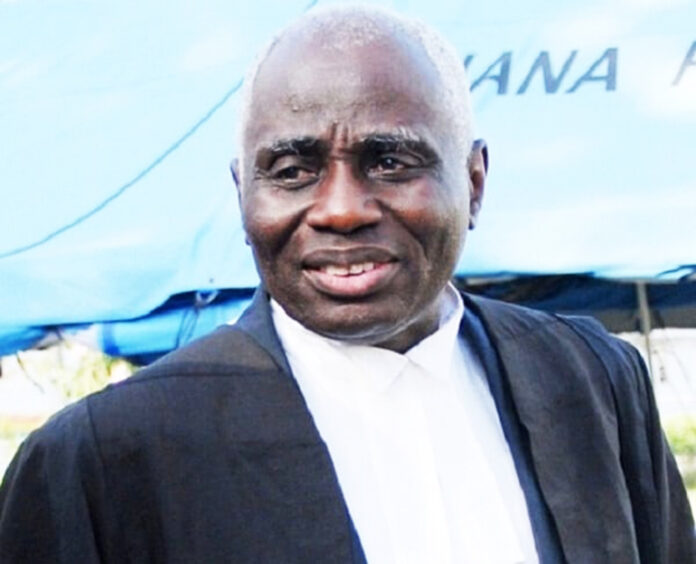Tsatsu Tsikata and Godfred Yeboah Dame, Attorney-General (A-G) and Minister of Justice, have, once again, locked horns over the trial of James Gyakye Quayson, Member of Parliament (MP) for Assin North in the Central Region.
The two members of the Bar were literally at each other’s throat during yesterday’s sitting at the High Court.
The action between the two arose when Mr. Tsikata threw the first ‘blow’ on the conduct of the A-G in the trial. This was at the time when the counsel was making a submission for a review of the High Court’s ruling of June 16, that the case should be heard on a day-to-day basis.
According to the defence counsel, the A-G had conducted himself unprofessionally in the case with remarks that supposedly predetermined the conclusion of the trial.
In fact, he compared the circumstances leading to his imprisonment in 2008 to that of the embattled James Gyakye Quayson.
He said the A-G and President Akufo-Addo had already predetermined the trial by their alleged remarks on various platforms, including a recent campaign rally held at Assin North for a by-election. This claim was supported by the playing of a one and half minutes of a tape recording of an alleged voice of the President.
Justice Mary Maame Ekue Yanzuh was told that President Akufo-Addo and Mr. Dame had made prejudicial comments to the effect that the MP would suffer the same fate as Abu Daramani Sakande.
Mr. Tsikata raised five grounds in the motion, filed on June 27, 2023, for a review and or variation of certain orders made by the court in its ruling of June 16.
He said the court erred in law when it failed to appreciate its limitations in the exercise of its discretion, and the rights of the accused (Quayson), which are in violation of the 1992 Constitution. He prayed that the rights of the accused, which were overlooked in the ruling, should be protected.
Furthermore, Section 69 of the Criminal Procedure Code neither requires nor justifies a criminal trial being done day to day, and the court, in fact, on the 16th of June, 2023, did not have jurisdiction to hear and determine the oral application made by the A-G without prior notice to the accused and his lawyers.
The last ground for his submission was that per incuriam is a binding decision of the Supreme Court.
He, therefore, urged the court to stay proceedings, since “continuing the hearing would prejudice the issues of the right of fair trial, right to be presumed innocent, as well as the limit on discretionary power that are part of the appeal.
Mr. Dame, in response, expressed his sympathy for the fate suffered by Quayson’s counsel, but could not find the nexus between the instant case and Mr. Tsikata’s circumstances.
He reiterated that Mr. Tsikata’s issue happened some 15 years ago and did not know where the bearing lay in this suit.
The government legal advisor contended that the one and half minutes tape recording was taken out of contest, and the impulse of the rally message would be appreciated if played in full. “It is completely unjust, and an attempt to deliberately distort; to select only 15 seconds of the tape does not amount to any prejudice against the accused.”
Although he objected to the playing of the alleged audio of President Akufo-Addo at the said campaign rally, the court overruled him.
Additionally, the remarks made by him and being referred to by the accused’s lawyers were made in respect to a civil matter, and not the instant case.
The court was told that Mr. Tsikata failed to allude to even a word the A-G made.
The A-G opposed the application for a review of the court’ decision on the grounds of irrelevance and distortion of facts.
According to him, the accused was opposing the hearing of the case between 20th and 23rd June, meanwhile his application was filed on June 27, 2023. “The question the court ought to ask itself is, are we still within the 20th and 21st. To the extent it was filed after 23rd, it was unnecessary.”
He argued that the instant application was grossly incompetent and ought to be dismissed. He further added that if the court could give long adjournments, there was nothing wrong if the same gives short adjournments.
Mr. Tsikata rebutted that in all of the arguments of the A-G no references had been made to the significance of the Articles and his claim that the application only referred to the 20th to 23rd June which was not true.
However, the application clearly referred to the day-to-day trial and the issue of disclosure, as the defence side was clear about Article 19, which talked about fair trial that there was no basis for a day-to-day trial.
The court has adjourned to July 11, 2023, to rule on the review application.








